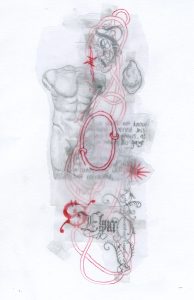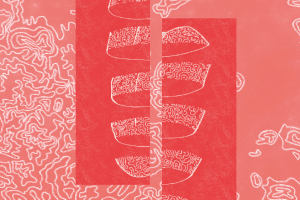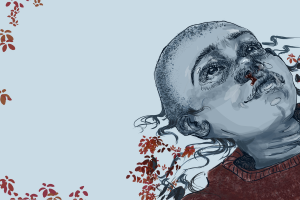
Waiata-tangi o te moana: The Seafarer
by Harriet Carter | January 11, 2022
This is my own creative translation of the first 18 lines of the anonymous Old English (Anglo-Saxon) Poem The Seafarer. I have incorporated te reo Māori words (and the occasional OE) in my translation, as I’ve wanted to give the reader a glimpse of the beauty of bilingual expression. The poem is one of hardship, despair and pain. In reading non-English words, perhaps the reader will experience some of the unfamiliarity the poet-speaker experiences. A translator always faces the challenge of how to grasp issues, phrases, images from the original cultural context and reinterpret them into a new tongue in a way that makes sense. Because of this, elements are always lost or compromised. I wanted to experiment with how these compromises might receive new life through the words of another language.
As both British and a New Zealander I am always interested in the ways that the literary traditions from each country speak to each other, and how bringing them into conversation might afford new revelations. Like the “Anglo-Saxons”, Māori are a strongly oral culture, and their history makes it to us through oral histories, waiata (songs) and chants. They were also a sea-faring nation who abandoned the comforts of their own countries in search of a new homeland. The Seafarer thus seemed an obvious choice of a poem to further probe these similarities. That this poem is a tale of oneself, to me, parallels the Māori mihi – or whakapapa – an introduction of a person. Whakapapa is a recitation of genealogy but it literally means ‘to place in layers’, that is, it’s the telling of the story of one’s place in relation to the wider world. Each individual’s whakapapa is unique, because it not only details one’s family names, tribal affiliation, but also the lands, mountains and seas one relates to. The kin-less seafarer’s speech juxtaposes the familial of the Māori greeting. I took inspiration from mōteatea (which means both to grieve as well as referring to a traditional sung chant) to voice the seafarer’s lament:: are we anything without our people? Indeed, who am I, when I belong to two nations but must always be separated from one of my homes?
If the past year has taught us anything it is the agony of loneliness. Isolation and anxiety are constricting forces, and one of the elements most remarked by scholars about the poem is how the poet-speaker returns constantly to images of containment. I felt challenged to explore the pathetic fallacy given to us, and to wrestle (wraxle?) with how modern English words might be used to express both the physical as well as the emotional pains of the seafarer.
The Old English poem ends over 100 lines later with the poet dwelling on the hope of God’s heavenly kingdom. I find it the most compelling part of the poem, for though it gives space to express one’s pain, it refuses to submit to suffering, instead offering the weary redemption. Although my poem is so short I wanted to allude to the original ending. Here, it is day and the freedom from darkness. The two bible verses are taken from the Māori translation and are also used in the Māori book of Common Prayer as prayers for times of hardship, and point to the universal, multi-lingual, ephemerality of hope.
Waiata-tangi o te moana: The Seafarer
(Auē! Auē! Ka mau te punga
here o te waka nei)
May I of myself a truth-song utter,
Speak of journeys; how I in toil-days suffered
ko te whiu ko te whakarīrā.
See: I have borne bitre breostceare,
known in my keel the wretch-dark places
how the waves scour there where I was kept, pressed in the ship’s spine
inā, in nearo nihtwaco (O how the watchful nights draw in)
as she bruised against the cliffs.
Hereherea e ngā herehuka, forste gebunden,
my feet, cold-fettered, there where those cares bite,
burnt around the heart. Hunger tore within
the soul of the sea-weary.
That man knows not, he who on earth lives lively,
how I, wrecca kei waho kei te moana
winter-dwelt the paths of exile,
deprived of kinsmen (e te iwi? e taku iwi e?)
where hail skirmish sieged hanged with frost, rime strangled;
there I heard nothing but the low resounding sea
But aye. Rē! Rē!
kua aua atu te po, ka tata te ao. Ko Ihowa i runga, te mea kaha
Notes:
-
- The title translates to ‘Lament of the Sea’
- I considered inventing a compound for the ‘b’ verse of line 11 : te hukapapa koromāhangatia. From hukapapa = frost. koromāhangatia = a verb referring to the action of looping a rope into a knot. Meaning “frost-bound” or more literally ‘the frost which has been tied into knots. Ultimately I chose the present line for its alliterative qualities – a primary device in OE poetry
- The verses of Line 22 are taken from the Romans 13:12 and Psalm 93:4 (Maori Bible). The Psalm’s full verse reads: Mightier than the thunder of great waters, mightier than the breakers of the sea: so the Lord on high is mighty.
- Finally, so many thanks to the brilliant Austin Haynes who edited my te reo, helped with my pronunciation, and for his suggestion in line 11.
Translation (in order of appearance)
- (ll 1-2)Auē! = wail/distress/sound of lament // Ka mau te punga
- here o te waka nei = “The anchor of this canoe is taken”.
- (l. 5) ko te whiu ko te whakarīrā = “Sentenced to hard labour”
- (l.6) Old English = ‘Bitter breast-care’ meaning chest/heart
- (l.9) Inā = An Exclamation meaning “Here! See how!”
- (l.9) Old English = “Narrow nightwatch”
- (l.11) Old English = “frost-bound were my feet”. // hereherea e ngā herehuka = “Imprisoned/shackled with ice-restraints).
- (l.16) Old English. ‘Wrecca’ = “wretch, stranger, exile’. Note, this is not the word used in the original but a substitute I have re-interpreted
- (l.16) kei waho kei te moana = “on the open sea”
- (l.18) e te iwi? e taku iwi e? = “My People, my People”
- (l.21) Rē! = Expression, Exclamation = “See! There! Look!”
- (l.22) kua aua atu te po, ka tata te ao = “The night is nearly over; the day is almost here” // Ko Ihowa i runga, te mea kaha = the Lord on high is mighty ∎
Words by Harriet Carter.




